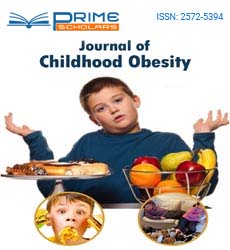Short Communication - (2023) Volume 8, Issue 6
Addressing the Health Challenges of Obese Children Call to Action
Sarah George*
Department of Health Sciences, Michigan State University, United States of America
*Correspondence:
Sarah George,
Department of Health Sciences, Michigan State University,
United States of America,
Email:
Received: 29-Nov-2023, Manuscript No. ipjco-24-18852;
Editor assigned: 01-Dec-2023, Pre QC No. ipjco-24-18852 (PQ);
Reviewed: 15-Dec-2023, QC No. ipjco-24-18852;
Revised: 20-Dec-2023, Manuscript No. ipjco-24-18852 (R);
Published:
27-Dec-2023, DOI: 10.21767/2572-5394-23.8.62
Introduction
Childhood obesity has emerged as a significant public health
concern, with a rising number of children worldwide grappling
with excess weight. This alarming trend not only poses
immediate health risks but also sets the stage for a plethora
of long-term health issues. It is crucial to understand the
multifaceted aspects of obese child health and to implement
effective strategies to tackle this growing problem. Obese
children face a range of immediate health risks that can impact
their overall well-being. These risks include an increased
likelihood of developing type 2 diabetes, hypertension, and
high cholesterol levels. The strain on their cardiovascular
system and the potential for early onset of chronic conditions
emphasize the urgent need for intervention. Furthermore,
obese children often experience psychological and social
challenges, including low self-esteem, depression, and social
isolation. The emotional toll of obesity can contribute to a cycle
of unhealthy behaviors, creating a vicious circle that persists
into adulthood [1,2].
Description
The consequences of childhood obesity extend into adulthood,
setting the stage for a myriad of health issues. Obese children
are at a higher risk of becoming obese adults, increasing their
susceptibility to conditions such as heart disease, stroke,
and certain types of cancer. The long-term impact on mental
health also persists, potentially leading to anxiety, depression,
and a diminished quality of life. Tackling childhood obesity
requires a comprehensive approach that addresses both
the physical and environmental factors contributing to the
problem. Encouraging a balanced diet, promoting regular
physical activity, and fostering a supportive home environment
are essential components of any effective strategy. Education
plays a pivotal role in empowering both parents and children
to make healthier lifestyle choices. Schools can implement
nutrition education programs, promoting the importance of
a well-rounded diet and the risks associated with excessive
consumption of sugary and processed foods. In addition,
communities must work together to create environments
that facilitate healthy living. This involves increasing access to
affordable, nutritious food options, promoting safe spaces for
physical activity, and collaborating with local organizations to
establish community programs focused on promoting overall
well-being. Understanding the challenges faced by families with
obese children is crucial to providing effective support. Parents
often need guidance on creating a health-promoting home
environment, incorporating nutritious meals, and encouraging
regular physical activity. The consequences of childhood
obesity extend into adulthood, setting the stage for a myriad of
health issues. Obese children are at a higher risk of becoming
obese adults, increasing their susceptibility to conditions
such as heart disease, stroke, and certain types of cancer. The
long-term impact on mental health also persists, potentially
leading to anxiety, depression, and a diminished quality of life.
Tackling childhood obesity requires a comprehensive approach
that addresses both the physical and environmental factors
contributing to the problem [3,4].
Conclusion
Encouraging a balanced diet, promoting regular physical
activity, and fostering a supportive home environment are
essential components of any effective strategy. Education
plays a pivotal role in empowering both parents and children
to make healthier lifestyle choices. Schools can implement
nutrition education programs, promoting the importance of
a well-rounded diet and the risks associated with excessive
consumption of sugary and processed foods. In addition,
communities must work together to create environments
that facilitate healthy living. This involves increasing access to
affordable, nutritious food options, promoting safe spaces for
physical activity, and collaborating with local organizations to
establish community programs focused on promoting overall
well-being. Understanding the challenges faced by families with
obese children is crucial to providing effective support. Parents
often need guidance on creating a health-promoting home environment, incorporating nutritious meals, and encouraging
regular physical activity.
Acknowledgement
None.
Conflict Of Interest
The author declares there is no conflict of interest in publishing
this article.
References
- Kachurak A, Davey A, Bailey RL, Fisher JO (2018) Daily snacking occasions and weight status among us children aged 1 to 5 years. Obes 26:1034-1042.
[Crossref] [Google Scholar]
- Fatima Y, Doi SA, Mamun AA (2016) Sleep quality and obesity in young subjects: A meta-analysis. Obes Rev 17:1154-1166.
[Crossref] [Google Scholar]
- Bac A, Wozniacka R, Matusik S, Golec J, Golec E (2012) Prevalence of overweight and obesity in children aged 6-13 years alarming increase in obesity in Cracow, Poland. Eur J Pediatr 171(2):245-251.
[Crossref] [Google Scholar]
- Ledoux TA, Hingle MD, Baranowski T (2011) Relationship of fruit and vegetable intake with adiposity: A systematic review. Obes Rev 12(5):143-150.
[Crossref] [Google Scholar]
Citation: George S (2023) Addressing the Health Challenges of Obese Children Call to Action. J Child Obesity. 8:62.
Copyright: © 2023 George S. This is an open-access article distributed under the terms of the Creative Commons Attribution License, which permits unrestricted use, distribution, and reproduction in any medium, provided the original author and source are credited.

